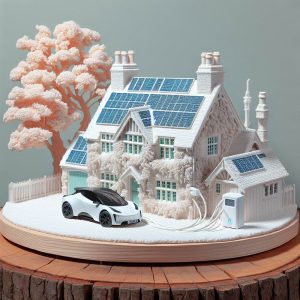 As the global focus on sustainability grows, the property market in the UK is undergoing significant changes. The intersection of environmental responsibility and legal due diligence is reshaping how residential and commercial property transactions are conducted.
As the global focus on sustainability grows, the property market in the UK is undergoing significant changes. The intersection of environmental responsibility and legal due diligence is reshaping how residential and commercial property transactions are conducted.
As expert property solicitors, we are witnessing a marked increase in inquiries about energy efficiency, eco-friendly refurbishments, and their implications for conveyancing. This article explores how sustainability is influencing the property landscape and offers practical insights for buyers, sellers, and investors. Expert guidance in conveyancing can make all the difference.
The Role of Energy Efficiency in Home Buying Decisions
The UK Government’s Push for Greener Homes
In recent years, the UK government has introduced several initiatives to encourage energy efficiency in residential and commercial properties. These include:
- EPC Ratings:
Energy Performance Certificates (EPCs) are mandatory for properties being sold or rented in the UK. They provide a rating from A (most efficient) to G (least efficient) and offer recommendations for improvement. By 2025, rental properties must meet a minimum EPC rating of C, and similar standards are likely to apply to sales in the near future. - Green Home Grants:
Though now discontinued, the Green Home Grant Scheme demonstrated the government’s commitment to subsidising energy efficiency improvements, such as insulation and heat pumps. Future schemes may build on this foundation. - Net-Zero Goals:
With a legal obligation to achieve net-zero carbon emissions by 2050, the government is incentivising low-carbon technologies, such as solar panels, electric vehicle (EV) charging points, and sustainable heating systems.
Energy Efficiency as a Buyer Priority
Today’s buyers are increasingly aware of the financial and environmental benefits of energy-efficient homes. Key factors influencing their decisions include:
- Lower Energy Bills:
Properties with high EPC ratings typically have lower utility costs, making them more attractive to budget-conscious buyers. - Resale Value:
Energy-efficient homes often command higher resale values as the market shifts toward greener living. - Mortgage Incentives:
Green mortgages, which offer preferential rates for energy-efficient properties, are gaining popularity among first-time buyers and investors.
Legal Considerations for Conveyancers
As a conveyancer, it’s crucial to address the implications of energy efficiency during the transaction process. This includes:
- EPC Verification:
Ensuring that the EPC is up-to-date and reflects the property’s current condition. - Green Retrofit Disclosures:
If the seller has undertaken recent improvements, such as solar panel installation or insulation upgrades, documentation must be provided to verify compliance with building regulations.
Trends in Eco-Friendly Refurbishments
What Are Eco-Friendly Refurbishments?
Eco-friendly refurbishments involve upgrades designed to reduce a property’s environmental impact. Popular trends include:
- Insulation Improvements:
Enhancing wall, roof, and floor insulation reduces heat loss and energy consumption. - Renewable Energy Installations:
Solar panels, wind turbines, and biomass boilers are increasingly common in both residential and commercial settings. - Sustainable Materials:
Using recycled or locally sourced materials for renovations minimises the carbon footprint. - Smart Home Technology:
Devices like smart thermostats and energy-efficient lighting systems optimize energy use.
Legal Implications for Buyers and Sellers
When a property features eco-friendly refurbishments, conveyancers must pay special attention to:
- Regulatory Compliance:
Have the upgrades been installed in accordance with planning permissions and building regulations? - Warranties and Guarantees:
Buyers should receive documentation for warranties associated with installations, such as solar panels or heat pumps. - Maintenance Responsibilities:
Certain green technologies require regular upkeep. Conveyancers should clarify maintenance obligations, particularly for communal systems in shared ownership properties. - Grants and Subsidies:
If the seller has benefited from government grants for refurbishments, buyers need to be aware of potential repayment obligations.
The Commercial Property Perspective
Sustainability in Commercial Leases
In the commercial property sector, sustainability is becoming a key consideration for landlords and tenants. Green leases, which include clauses promoting energy efficiency, are on the rise. Key aspects include:
- Shared Responsibilities:
Landlords and tenants may agree to share the cost of sustainability upgrades, such as LED lighting or energy-efficient HVAC systems. - Benchmarking Performance:
Some leases include provisions for tracking and reporting energy use, helping both parties meet ESG (Environmental, Social, and Governance) targets.
Implications for Conveyancers
Commercial conveyancers must navigate unique challenges when dealing with sustainable properties:
- Due Diligence on Retrofitting:
Investigate whether previous refurbishments meet current energy efficiency standards and comply with commercial property regulations. - Environmental Risk Assessments:
Ensure that due diligence includes checks for potential environmental liabilities, such as contamination or inadequate waste management. - BREEAM Certification:
A growing number of commercial properties are seeking BREEAM (Building Research Establishment Environmental Assessment Method) certification, which assesses sustainability performance. Buyers should understand the implications of owning or occupying a certified building.
Navigating the Challenges of Sustainability in Conveyancing
Balancing Costs and Benefits
While sustainability offers long-term benefits, upfront costs can be a deterrent for some buyers and investors. Conveyancers should:
- Help clients evaluate the financial impact of sustainability upgrades.
- Provide advice on financing options, including green mortgages and grants.
Mitigating Legal Risks
As with any evolving field, sustainability introduces new risks for property transactions. Common pitfalls include:
- Fraudulent Certifications:
Verify the authenticity of EPCs, BREEAM ratings, and other sustainability credentials. - Hidden Costs:
Ensure clients are aware of potential expenses, such as maintaining renewable energy systems or replacing outdated technologies.
Keeping Pace with Policy Changes
Sustainability is a dynamic area of law and policy. Conveyancers must stay informed about:
- Updates to EPC regulations and minimum standards.
- New government initiatives promoting energy efficiency.
- Changes to planning permissions for green refurbishments.
Why Choose Midwinters Solicitors?
At Midwinters Solicitors, we understand that sustainability is more than a trend—it’s a fundamental shift in how properties are valued, bought, and sold. Our experienced team offers:
- Comprehensive Legal Support:
- From EPC verification to green lease negotiation, we handle every aspect of sustainable property transactions.
- Tailored Advice:
Whether you’re a buyer, seller, or investor, we provide personalised guidance to help you navigate the complexities of sustainability. - Proactive Updates:
We keep our clients informed about the latest legal and policy developments, ensuring that your transaction is compliant and future-proof.
Conclusion
Sustainability is transforming the property market, making energy efficiency and eco-friendly refurbishments central to residential and commercial transactions. For buyers, these changes present opportunities to reduce costs and environmental impact. For sellers and landlords, they offer a chance to enhance property value and attract eco-conscious tenants.
As expert property solicitors and conveyancers, our role is to bridge the gap between these opportunities and the legal framework, ensuring that all parties can benefit from this shift toward greener living and working spaces. At Midwinters Solicitors, we are committed to helping our clients navigate this evolving landscape with confidence.
For more information about our conveyancing services, visit Midwinters Solicitors or contact us today to discuss your needs.




